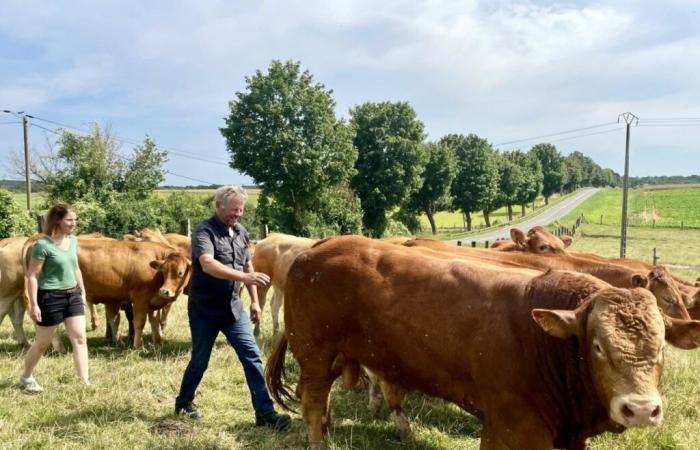Par
Thomas Hoffmann
Published on
Nov 10 2024 at 9:10 a.m
See my news
Follow La Gazette du Val d’Oise
In the fields bordering the D22 in Bréançon (Val-d'Oise), a small herd of Limousin cows takes advantage of the good weather to graze.
“This is one of the advantages of the excess rain that we have had in recent months, they have plenty of grass to eat,” smiles Éric Van Isacker.
Before continuing: “I took them last year. This is the first time I'm trying this breed, I've always been into Charolais. »
Aged 62, the breeder has devoted his entire life to his animals after taking over his parents' farm. “My mother told me that from the age of five I hung out among the cows. »
At the Ferme de l'Arche, it is today accompanied by his daughter Sonia, 35, that Éric Van Isacker runs his cattle farm, one of the last in Val-d'Oise.
An activity which has become rarer, both for demographic reasons, cattle breeders being among the oldest in the agricultural profession, and for a problem of remuneration of farmers.
“Everything has increased in recent years. We are trying to fight, but we are suffering from the rise in the cost of raw materials, the price of mechanical parts and machines.
Our baling press (a method of preserving harvested grass, editor's note) bought for €48,000 ten years ago is worth €78,000 today, that's absurd! And then there are all these European standards…”, complains Eric.
“We were always afraid of changing our prices, but we finally had to do it two years ago by increasing the kilo of meat by one euro,” continues Sonia.
A development which, however, is not enough. “We have to diversify to survive. That's why we launched a horse boarding facility. We also set up a reception room. »
“It gave us additional income, otherwise it would have been catastrophic. »
It is above all a decision taken twenty years ago which allowed the Ferme de l'Arche to survive. In 2004, Éric Von Isacker launched into direct sales.
“It gave us additional income, otherwise it would have been catastrophic. »
Today, 70% of their livestock is intended for this activity.
“We sell packages on our website to order. We have a fairly loyal clientele to whom we can offer local meat that we prepare ourselves in our own laboratory,” explains Sonia.
“When we see that 27% of the meat consumed in France comes from abroad, thousands of kilometers away, that’s nonsense. While we can do it,” regrets Eric.
But, again, the father and his daughter were forced to adapt over the years.
“Many slaughterhouses have closed. Before I went to Forges-les-Eaux (Seine-Maritime), now we take our animals to Formerie (Oise). When we see that trucks come from the South of France to there, we say to ourselves that there is a problem. Animals suffer. »
Animals that the breeder pampers
“The income from direct sales did not allow us to earn more money, but to improve the living conditions of our cows and calves. We were able to build them a large shed for the winter,” confides Éric, while from mid-April, his 165 animals live on the farm’s 80 ha of meadow.
A farm from which 100% of their food comes. So, when he is not taking care of it, the breeder puts on his farmer's hat to cultivate his fields.
“All the barley we harvest, we keep for our animals. We do not buy any meal, it is our cereals that are used to feed them. Animals do all this for us. They have fewer illnesses, so no veterinary costs, which allows us to save money. »
Here again, the breeder gives of himself by taking care of calving and possible cesarean sections.
“I’m broken all over”
A titanic job which explains why so many breeders have given up.
“I'm broken all over,” says Eric, emphasizing with a smile: “But I love what I do. »
This passion is what brought Sonia Van Isacker back to operations after having worked for several years in communications.
“It’s a legacy. I couldn't see myself abandoning it, and anyway I planned my life around the farm. »
A breeding of which she was expected to take over the reins at the end of 2024.
To allow the Ferme de l'Arche to remain one of the last bastions of livestock breeding in Val-d'Oise.
Follow all the news from your favorite cities and media by subscribing to Mon Actu.






